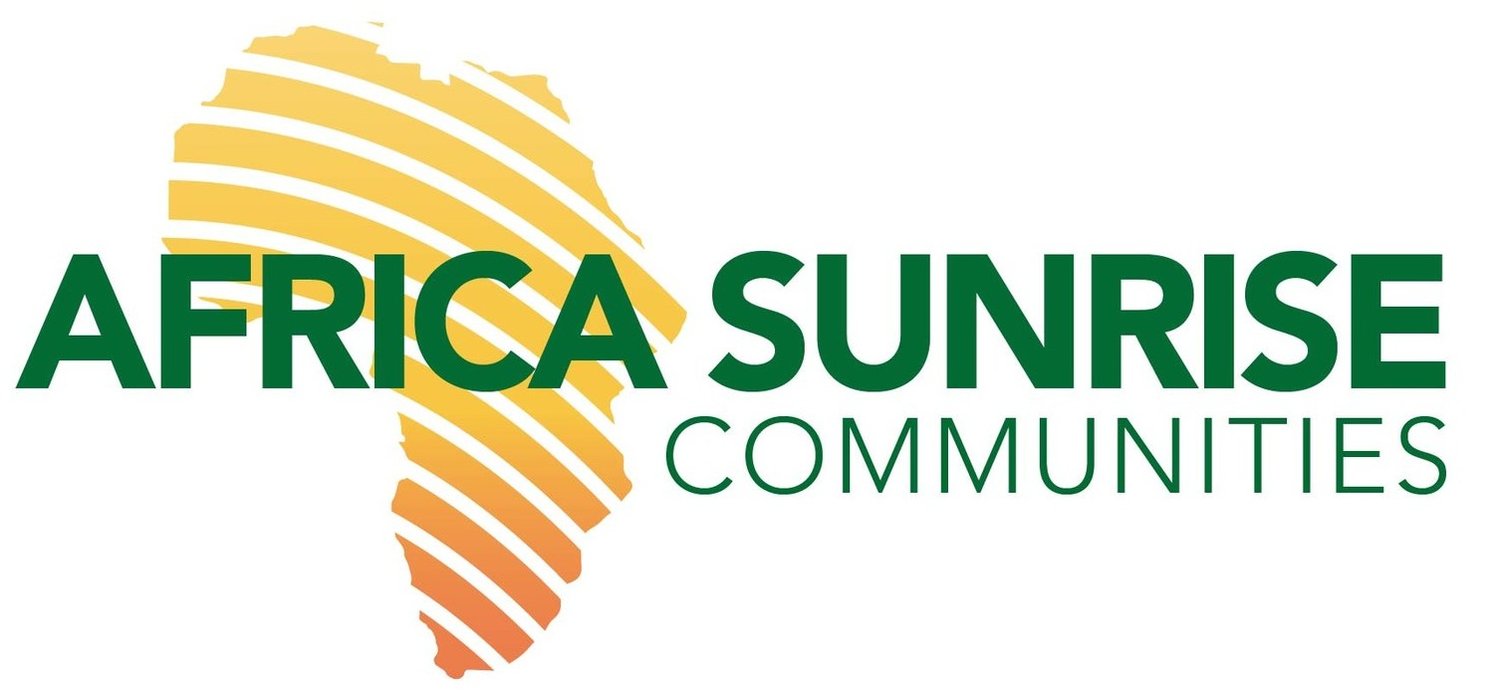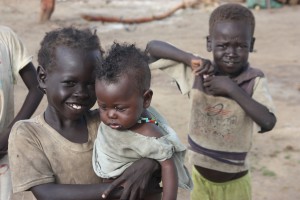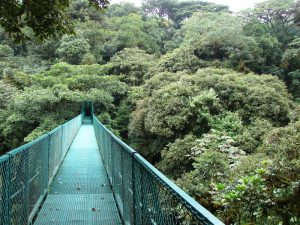 Several other Asbury Seminary students and I went to Costa Rica for a week-long workshop in June. My experience to Costa Rica was wonderful and I loved it. One of the strong points of Costa Rica is that it an extremely peaceful country. They even did away with their army in 1949 and all of their crime problems are handled by their police force. Everywhere you go the people are very welcoming as they greet you with smiles and seem happy to see you. It has become known as an unchanged tropical paradise due to its quiet history as a backwoods area, which protected it from early historical colonial turmoil and exploitation. Today’s Costa Rica cashes in on its purity and cleanliness. It has a famous jungle awning and they have constructed an “awning walk” tour that lets you travel through the jungle like a monkey. It’s also known for its zip-lining tours. There are world-famous surfing waves on the beaches on both sides of the country and they are known as one of the top three surfing destinations in the world. In addition to all of the exciting and adventurous things to do in Costa Rica, it is also a great place for those who just need a break in between adventures or who want a time of rest and relaxation. The rainy season can be the best time to go since it is not so crowded.With the peaceful and prosperous atmosphere of Costa Rica, it is no surprise that their pastors and the bishop are among the happiest in the church. The food in Costa Rica is also some of the best I have ever tasted. It’s main staple foods are rice and beans, known as gallo pinto. Much of the flavor of their food comes from their main sauce called lizano salsa. They put it on everything and the people love it. They even sell it at the airport. Costa Rica is also a huge producer of coffee, along with bananas and chocolate. Anyone who goes there should be sure to take a tour of Villa Vanilla farms to see how they make chocolate and vanilla, along with pepper, cinnamon and more.
Several other Asbury Seminary students and I went to Costa Rica for a week-long workshop in June. My experience to Costa Rica was wonderful and I loved it. One of the strong points of Costa Rica is that it an extremely peaceful country. They even did away with their army in 1949 and all of their crime problems are handled by their police force. Everywhere you go the people are very welcoming as they greet you with smiles and seem happy to see you. It has become known as an unchanged tropical paradise due to its quiet history as a backwoods area, which protected it from early historical colonial turmoil and exploitation. Today’s Costa Rica cashes in on its purity and cleanliness. It has a famous jungle awning and they have constructed an “awning walk” tour that lets you travel through the jungle like a monkey. It’s also known for its zip-lining tours. There are world-famous surfing waves on the beaches on both sides of the country and they are known as one of the top three surfing destinations in the world. In addition to all of the exciting and adventurous things to do in Costa Rica, it is also a great place for those who just need a break in between adventures or who want a time of rest and relaxation. The rainy season can be the best time to go since it is not so crowded.With the peaceful and prosperous atmosphere of Costa Rica, it is no surprise that their pastors and the bishop are among the happiest in the church. The food in Costa Rica is also some of the best I have ever tasted. It’s main staple foods are rice and beans, known as gallo pinto. Much of the flavor of their food comes from their main sauce called lizano salsa. They put it on everything and the people love it. They even sell it at the airport. Costa Rica is also a huge producer of coffee, along with bananas and chocolate. Anyone who goes there should be sure to take a tour of Villa Vanilla farms to see how they make chocolate and vanilla, along with pepper, cinnamon and more. 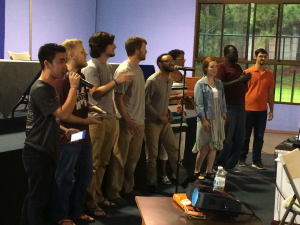 During my recent visit to Costa Rica for a one-week workshop concerning mission experiences, I met a friend who asked me a very interesting question that I had never thought about. Alex never gave me his full name, because of security reasons, he said. He said he would give me his heart forever, but not his name.Alex was interested in my life experience, because, as he said, “My life experiences have not been like yours, Jacob. All my experiences were from drugs, running after women, prostitutes, and so on. All that bad stuff has gone through my life. But, my amigo Jacob, you were facing such difficulties, even death, in your life experience. I am always interested in looking at the experiences of others so that I can learn from them and adjust my life. I am very excited to learn from you by knowing about your life.“First of all, I am very excited to meet you. Also, I am very thankful to God to bring you here to Alajuela Provenance in Costa Rica. I have never met an African or African-American in my life. God brought you here so I could meet you.“You remember what happened in I Kings 18:21 when Elijah said to the people, ‘How long halt ye between two opinions? If the LORD be God, follow him; but if Baal, then follow him.’ I know, Jacob, you will be like Elijah to your people by bringing them peace and justice. If they choose peace and restoration, then they will live. If they do not choose peace, then the refugees in East African countries will continue to be dead like they are already.”Alex asked me why black Africans don’t do mission outside of their world like white people do. Is it because they lack the resources? Or because they don’t like mission and don’t want to do mission in the world? He reminded me that only three of us in this workshop are black. When I asked him how many times he had been to this workshop, he replied he had been here four times. “This is a part of my knowledge and experience,” he said, “so I know what I am talking about.”When I asked him why he asked me such a searching question, he said, “Jacob, I know mission. I know more than you do. I am 67 years old, and have been a pastor leading a church for 27 years.”He told me about a man who had come to do mission work in Costa Rica with his family, but after a year he and his family left. They had five children and no support – no insurance, no money for school fees or for transportation, no money for rent. “I want to warn you, Jacob: is it about you or is it about God? I mean your family comes first, then the mission. Other people can pick up your mission but no one else can pick up and care for your family.”I can see good and evil in this advice. If God calls you into His service, you can’t say no. But evil can cause all sorts of problems for you and your family while following God’s call. It happened in my village when Muslims came and attacked my family just for being Christians.Alex told me that he had heard of many people leading in ministries and encouraging others
During my recent visit to Costa Rica for a one-week workshop concerning mission experiences, I met a friend who asked me a very interesting question that I had never thought about. Alex never gave me his full name, because of security reasons, he said. He said he would give me his heart forever, but not his name.Alex was interested in my life experience, because, as he said, “My life experiences have not been like yours, Jacob. All my experiences were from drugs, running after women, prostitutes, and so on. All that bad stuff has gone through my life. But, my amigo Jacob, you were facing such difficulties, even death, in your life experience. I am always interested in looking at the experiences of others so that I can learn from them and adjust my life. I am very excited to learn from you by knowing about your life.“First of all, I am very excited to meet you. Also, I am very thankful to God to bring you here to Alajuela Provenance in Costa Rica. I have never met an African or African-American in my life. God brought you here so I could meet you.“You remember what happened in I Kings 18:21 when Elijah said to the people, ‘How long halt ye between two opinions? If the LORD be God, follow him; but if Baal, then follow him.’ I know, Jacob, you will be like Elijah to your people by bringing them peace and justice. If they choose peace and restoration, then they will live. If they do not choose peace, then the refugees in East African countries will continue to be dead like they are already.”Alex asked me why black Africans don’t do mission outside of their world like white people do. Is it because they lack the resources? Or because they don’t like mission and don’t want to do mission in the world? He reminded me that only three of us in this workshop are black. When I asked him how many times he had been to this workshop, he replied he had been here four times. “This is a part of my knowledge and experience,” he said, “so I know what I am talking about.”When I asked him why he asked me such a searching question, he said, “Jacob, I know mission. I know more than you do. I am 67 years old, and have been a pastor leading a church for 27 years.”He told me about a man who had come to do mission work in Costa Rica with his family, but after a year he and his family left. They had five children and no support – no insurance, no money for school fees or for transportation, no money for rent. “I want to warn you, Jacob: is it about you or is it about God? I mean your family comes first, then the mission. Other people can pick up your mission but no one else can pick up and care for your family.”I can see good and evil in this advice. If God calls you into His service, you can’t say no. But evil can cause all sorts of problems for you and your family while following God’s call. It happened in my village when Muslims came and attacked my family just for being Christians.Alex told me that he had heard of many people leading in ministries and encouraging others 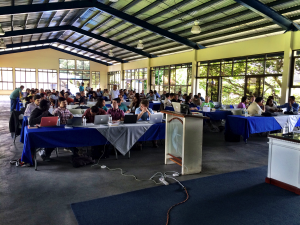 to support them and then later backing out because the ministry had not been what they expected. “I am not saying that this is what you will do, amigo,” Alex said. “I am praying for your mission. I have a lot of sympathy for what you have been through and I know that God is on His throne. At the same time I worry about your family. I know you have already paid a heavy price and that God has given you a mission, but be careful in your journey and with the people who come alongside to help you.”He encouraged me to keep close to the people who helped me since I came to the United States and those who have supported my education. “They love you and your family,” Alex said. “Listen to them and work with them, whether they continue to help you financially or not.”Alex continued, “They have invested in you and they have big hearts towards you. Be strong in your mission. Keep looking ahead, even if some people turn negative towards you. Know that God is your guide, your protector, your helper, and He will provide your resources. Don’t be fearful; if God has called you He will make a way for you.”“I advise you to put your family first and your mission second,” Alex said. “Don’t leave for Africa unless you have a clear idea of your support and when it will begin and end. I see you like a Martin Luther King or a Gandhi, bringing change to your people. Don’t become discouraged if some people do not get on board with your mission right away; sometimes people need to see something in action before they can bring themselves to support it. As Jesus said, look for the ‘house of peace’ in the community and work through that. Look for those who are ready to be helped.“I will be praying for you that God will bring people who will support you in your mission. Costa Rica is a very poor country and we don’t have much to support our ministry, but we can pray.”I appreciated talking with Alex because he was encouraging me while at the same time giving me advice from long experience in ministry. He reminded me to be grateful for those who have supported me in my education, my family and my mission. He also encouraged me to put God in charge of my mission. I realize that I need to look at my current reality to determine the direction I must go. I have been discussing his conversations with my wife. It was a blessing to me to meet this godly man, Alex. I will never forget him, because he is truly a man of God. If you want to see more of my time in Costa Rica, check out this videohttps://www.youtube.com/watch?v=-UpKmVu6XO0 Blessings,Jacob GuotASC Founder, and President
to support them and then later backing out because the ministry had not been what they expected. “I am not saying that this is what you will do, amigo,” Alex said. “I am praying for your mission. I have a lot of sympathy for what you have been through and I know that God is on His throne. At the same time I worry about your family. I know you have already paid a heavy price and that God has given you a mission, but be careful in your journey and with the people who come alongside to help you.”He encouraged me to keep close to the people who helped me since I came to the United States and those who have supported my education. “They love you and your family,” Alex said. “Listen to them and work with them, whether they continue to help you financially or not.”Alex continued, “They have invested in you and they have big hearts towards you. Be strong in your mission. Keep looking ahead, even if some people turn negative towards you. Know that God is your guide, your protector, your helper, and He will provide your resources. Don’t be fearful; if God has called you He will make a way for you.”“I advise you to put your family first and your mission second,” Alex said. “Don’t leave for Africa unless you have a clear idea of your support and when it will begin and end. I see you like a Martin Luther King or a Gandhi, bringing change to your people. Don’t become discouraged if some people do not get on board with your mission right away; sometimes people need to see something in action before they can bring themselves to support it. As Jesus said, look for the ‘house of peace’ in the community and work through that. Look for those who are ready to be helped.“I will be praying for you that God will bring people who will support you in your mission. Costa Rica is a very poor country and we don’t have much to support our ministry, but we can pray.”I appreciated talking with Alex because he was encouraging me while at the same time giving me advice from long experience in ministry. He reminded me to be grateful for those who have supported me in my education, my family and my mission. He also encouraged me to put God in charge of my mission. I realize that I need to look at my current reality to determine the direction I must go. I have been discussing his conversations with my wife. It was a blessing to me to meet this godly man, Alex. I will never forget him, because he is truly a man of God. If you want to see more of my time in Costa Rica, check out this videohttps://www.youtube.com/watch?v=-UpKmVu6XO0 Blessings,Jacob GuotASC Founder, and President
